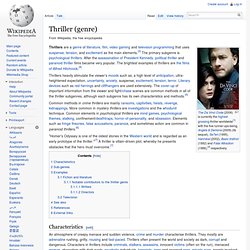

List of essayists.
Stephen Jay Gould. High fantasy. Genre overview[edit] High fantasy is defined as fantasy fiction set in an alternative, entirely fictional ("secondary") world, rather than the real, or "primary" world. The secondary world is usually internally consistent, but its rules differ in some way(s) from those of the primary world. By contrast, low fantasy is characterized by being set in the primary, or "real" world, or a rational and familiar fictional world, with the inclusion of magical elements.[1][2][3][4] Nikki Gamble distinguishes three subtypes of high fantasy:[3] Setting[edit] In some fiction, a contemporary, "real-world" character is placed in the invented world, sometimes through framing devices such as portals to other worlds or even subconscious travels.
High fantasy worlds may be more or less closely based on real world milieux, or on legends such as the Arthurian Cycle. Characters[edit] Many high fantasy storylines are told from the viewpoint of one main hero. Good versus evil[edit] Saga or series[edit] See also[edit]
Terry Brooks. Philip Pullman. J. K. Rowling. Science fiction. §Definition[edit] A futuristic setting is a common but not a necessary hallmark of science fiction.

A common thread in science fiction is exploring the potential consequences of scientific and other innovations on people's lives. According to science fiction writer Robert A. Heinlein, "a handy short definition of almost all science fiction might read: realistic speculation about possible future events, based solidly on adequate knowledge of the real world, past and present, and on a thorough understanding of the nature and significance of the scientific method. Science fiction is largely based on writing rationally about alternative possible worlds or futures.[8] It is similar to, but differs from fantasy in that, within the context of the story, its imaginary elements are largely possible within scientifically established or scientifically postulated physical laws (though some elements in a story might still be pure imaginative speculation). §History[edit] §The term "sci-fi"[edit]
Fictional universe. A fictional universe can be almost indistinguishable from the real world, except for the presence of the invented characters and events that characterize a work of fiction; at the other extreme it can bear little or no resemblance to reality, with invented fundamental principles of space and time. Definition[edit] What distinguishes a fictional universe from a simple setting is the level of detail and internal consistency.
A fictional universe has an established continuity and internal logic that must be adhered to throughout the work and even across separate works. So, for instance, many books may be set in conflicting fictional versions of Victorian London, but all the stories of Sherlock Holmes are set in the same Victorian London. However, the various film series based on Sherlock Holmes follow their own separate continuities, and so do not take place in the same fictional universe. Scope[edit] Format[edit] Collaboration[edit]
Ursula K. Le Guin. Mercedes Lackey. Christopher Paolini. J. R. R. Tolkien. Douglas Adams. Isaac Asimov. Frank Herbert. Thriller (genre) Thrillers are a genre of literature, film, video gaming and television programming that uses suspense, tension, and excitement as the main elements.[3] The primary subgenre is psychological thrillers.

After the assassination of President Kennedy, political thriller and paranoid thriller films became very popular. The brightest examples of thrillers are the films of Alfred Hitchcock.[4] "Homer's Odyssey is one of the oldest stories in the Western world and is regarded as an early prototype of the thriller. "[7] A thriller is villain-driven plot, whereby he presents obstacles that the hero must overcome.[7] Thrillers mostly take place in ordinary suburbs/cities. Thrillers often overlap with mystery stories but are distinguished by the structure of their plots. Similar distinctions separate the thriller from other overlapping genres: adventure, spy, legal, war, maritime fiction, and so on. Thrillers may be defined by the primary mood that they elicit: fearful excitement.